When a tractor’s steering cylinder begins to leak, the best option is often to remove it and replace it with a new one. This can be difficult if you’re unfamiliar with how to do it, but with the right instructions, it can be done relatively easily.
In this blog post, we’ll walk you through the steps involved in how to remove steering cylinder from tractor. We’ll also provide some tips on how to make the process go more smoothly. So if your tractor’s steering cylinder is leaking, read on for instructions on how to fix it!
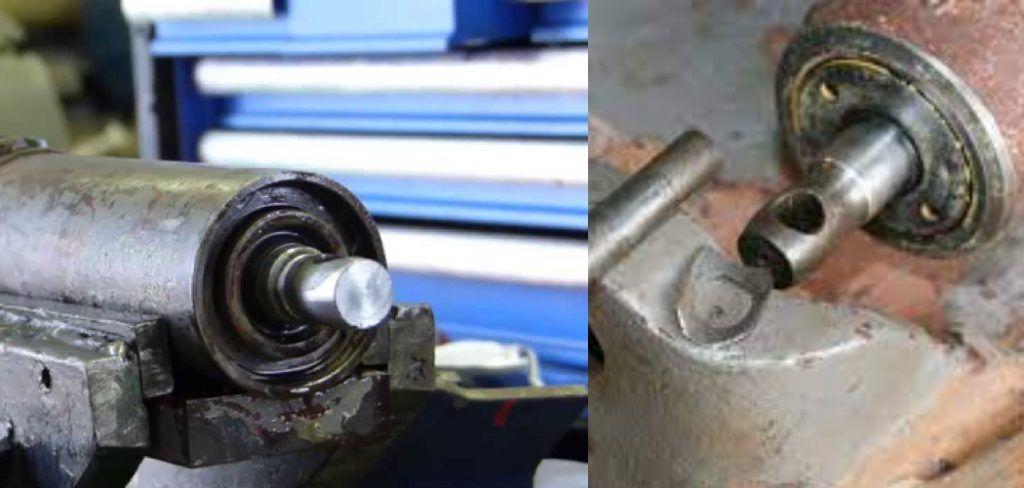
Step by Step Instructions: How to Remove Steering Cylinder From Tractor
Step 1: Park the Tractor on a Level Surface.
This is an important safety precaution. Working on a tractor that’s not level can be dangerous, so make sure to park it on a flat, level surface before beginning any work. If your tractor doesn’t have a level indicator, you can use a spirit or bubble level to check.
Step 2: Disconnect the Battery.
Again, this is for safety purposes. Any time you’ll be working with electrical components or wiring, it’s important to disconnect the battery first. Also, if your tractor is equipped with an ignition key, make sure it’s in the “off” position.
Step 3: Raise the Front End of the Tractor.
You’ll need access to the steering cylinder, so you’ll need to raise the tractor’s front end off the ground. You can do this using a jack or a lifting device such as a forklift. Ensure the front end is raised high enough that you can work beneath it comfortably.
Step 4: Support the Front End of the Tractor.
Once the front end is raised, you’ll need to support it, so it doesn’t fall and injure you while you’re working. You can do this by placing jack stands under the tractor’s frame or by using a lifting device such as a forklift. It would help if you made sure that the front end is raised high enough so that you can easily work on the steering components.
Step 5: Disconnect the Steering Cylinder.
The next step is to disconnect the steering cylinder. This can usually be done by unscrewing a retaining nut or clip holding it in place. Once the retaining device has been removed, the steering cylinder can be pulled away from the tractor. If there is resistance when trying to remove the steering cylinder, it may be necessary to use a pair of pliers or a wrench to loosen it. Be careful not to damage the threads on the steering cylinder when doing this.
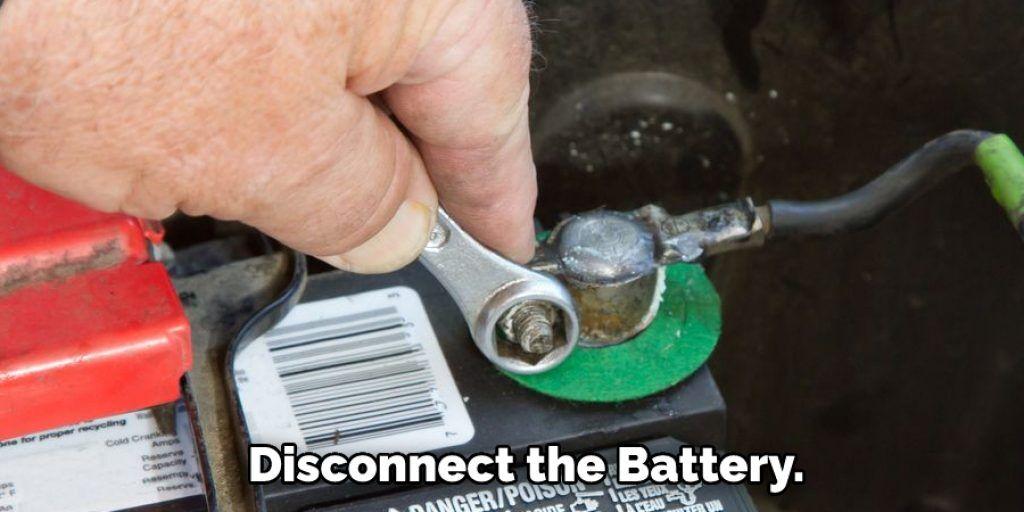
Step 6: Disconnect the Hydraulic Lines.
The steering cylinder is connected to the tractor’s hydraulic system, so you’ll need to disconnect the hydraulic lines before removing the cylinder. To do this, first, identify the lines connected to the steering cylinder. There will be two lines, one on each side of the cylinder. Next, loosen the nuts that secure the hydraulic lines to the steering cylinder using a wrench. Once the nuts are loose, carefully disconnect the lines from the cylinder. Also, check if the hoses are in good condition and not leaking before moving on to the next step.
Step 7: Remove the Steering Cylinder.
You can now remove the steering cylinder from the tractor with the disconnected hydraulic lines. To do this, simply unbolt the cylinder from its mounting bracket using the appropriate size wrench or socket. You may need to use a pry bar to loosen the cylinder from its bracket if it is stuck. Once the cylinder is loose, pull it out of the bracket and set it aside.
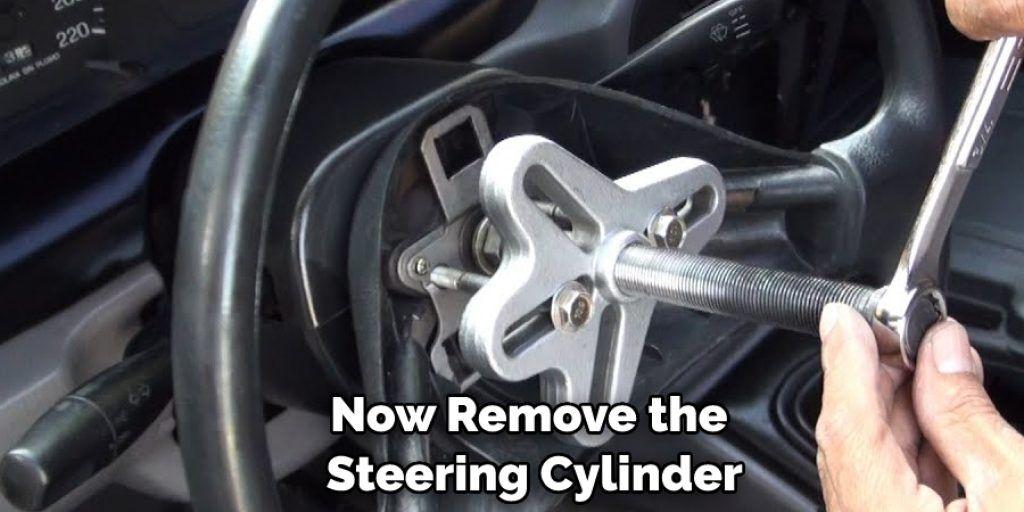
Step 8: Install the New Steering Cylinder.
To install the new steering cylinder, reverse the process used to remove the old one. Start by attaching the new cylinder to the tractor’s frame using the bolts and nuts. Then, attach the hydraulic hoses to the appropriate ports on the steering cylinder. Once everything is in place, fill up the reservoir with hydraulic fluid and bleed the system according to your tractor’s manual instructions. Finally, test the steering to ensure it’s working properly before driving the tractor.
With these steps, you should know how to remove steering cylinder from tractor and install a new one. While the process may seem daunting at first, it’s quite simple once you get the hang of it. Just follow all the instructions in your tractor’s manual to avoid any potential problems.
You Can Check It Out To Remove the Cylinder Head
Additional Tips and Advice
- It is advisable to have a friend help you with this project if possible.
- Make sure to properly support the tractor before beginning any work on it.
- Be very careful when working around hydraulic fluid, as it can be very slippery and dangerous.
- When removing the steering cylinder, pay attention to how it is oriented so that you can put it back in correctly.
- Take care not to damage any hydraulic lines or fittings when removing the steering cylinder.
- Be sure to dispose of any hydraulic fluid properly when finished.
- Always consult your tractor’s owner’s manual before attempting any repairs or maintenance.
With these tips in mind, removing the steering cylinder from your tractor should be a relatively straightforward process. However, Be sure to take all necessary precautions and work carefully to avoid any potential accidents or injuries.
When to Remove Steering Cylinder From Tractor?
Removing the steering cylinder when performing any work on the tractor’s steering system, such as repairing or replacing steering components, is necessary. The procedure for removing the steering cylinder will vary depending on the make and model of the tractor.
However, in most cases, it will be necessary to disconnect the hydraulic lines from the cylinder, disconnect the steering shaft from the cylinder, and then remove the mounting bolts that hold the cylinder in place.
Once the bolts are removed, the cylinder can be lifted from its mount. If you have difficulty removing the steering cylinder, consult a tractor repair manual for your specific make and model. The manual will provide detailed instructions on safely removing the steering cylinder.
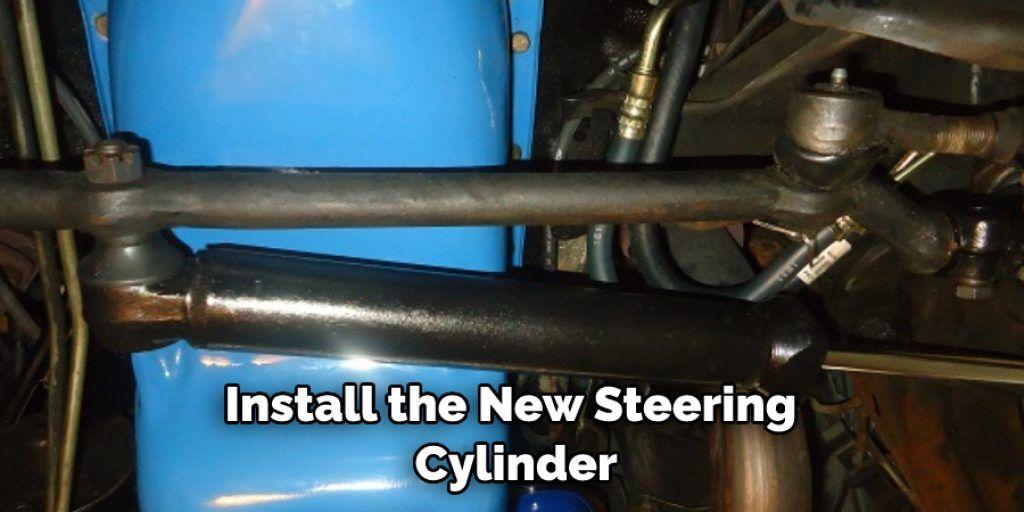
5 Possible Reasons That Causes Steering Cylinder to Leak:
1. Worn Out or Damaged Seals:
Over time, the seals inside the steering cylinder can become worn out or damaged. As a result, the hydraulic fluid inside the cylinder can start to leak out. If you notice that your steering cylinder is leaking, it’s a good idea to have the seals replaced as soon as possible. You must ensure the seals are properly replaced, so the hydraulic fluid doesn’t leak out again.
2. Faulty O-rings:
The O-rings are responsible for sealing the connection between the steering cylinder and the hydraulic fluid lines. If these O-rings are damaged or worn out, it can cause the hydraulic fluid to leak out of the steering cylinder. Replacing the O-rings is a relatively easy fix, and it’s something that you should do as soon as you notice that they are damaged.
3. Damaged Hydraulic Lines:
The hydraulic lines that connect to the steering cylinder can become damaged over time. If these lines are damaged, it can cause the hydraulic fluid to leak, which will eventually lead to steering problems. To repair this problem, the damaged lines will need to be replaced.
4. Worn Out Bearings:
The bearings in the steering cylinder can become worn out over time. If these bearings are not replaced, it can cause the steering cylinder to seize up. To ensure the bearings are in good condition, remove the steering cylinder from the tractor and inspect them. If the bearings are worn out, you will need to replace them with new ones.
5. Broken or Bent Piston Rod:
The steering wheel may become difficult to turn if the piston rod is bent or broken. In this case, it will be necessary to replace the steering cylinder. Ensure the new cylinder is the same size and style as the old one. If your tractor has a power steering system, ensure the new cylinder is compatible. You also need to ensure that the new cylinder is installed in the same orientation as the old one.
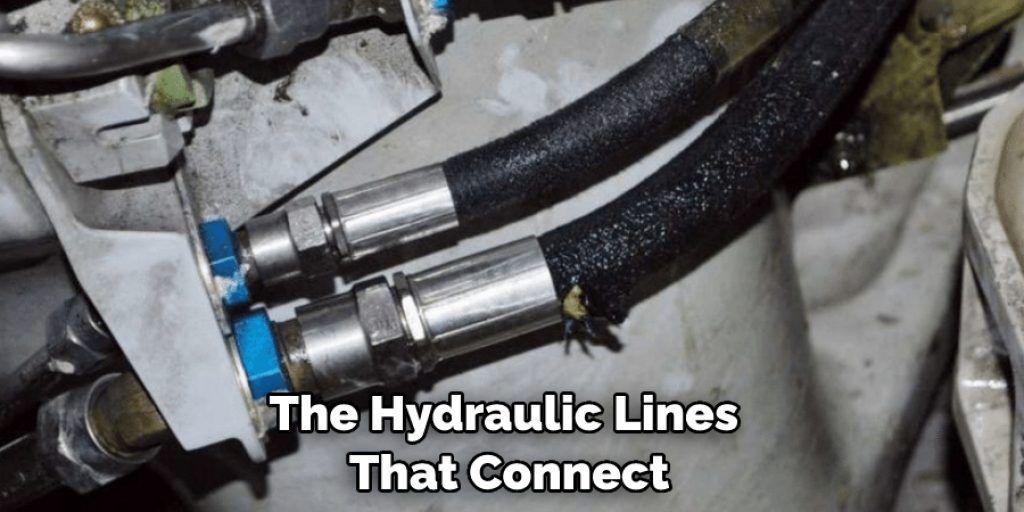
Final Thoughts
The tractor steering cylinder is a component that helps turn the tractor’s wheels. The process can be completed with just a few simple tools and patience. It is located between the wheel and the tractor’s frame and can be removed by following mentioned steps. Removing the steering cylinder from a tractor can be a daunting task.
However, it can be done relatively easily with the proper tools and instructions. In this post, we have walked you through how to remove steering cylinder from tractor step-by-step. We hope that this information will help make your next repair project easier. Have any questions? Feel free to reach out to us!

